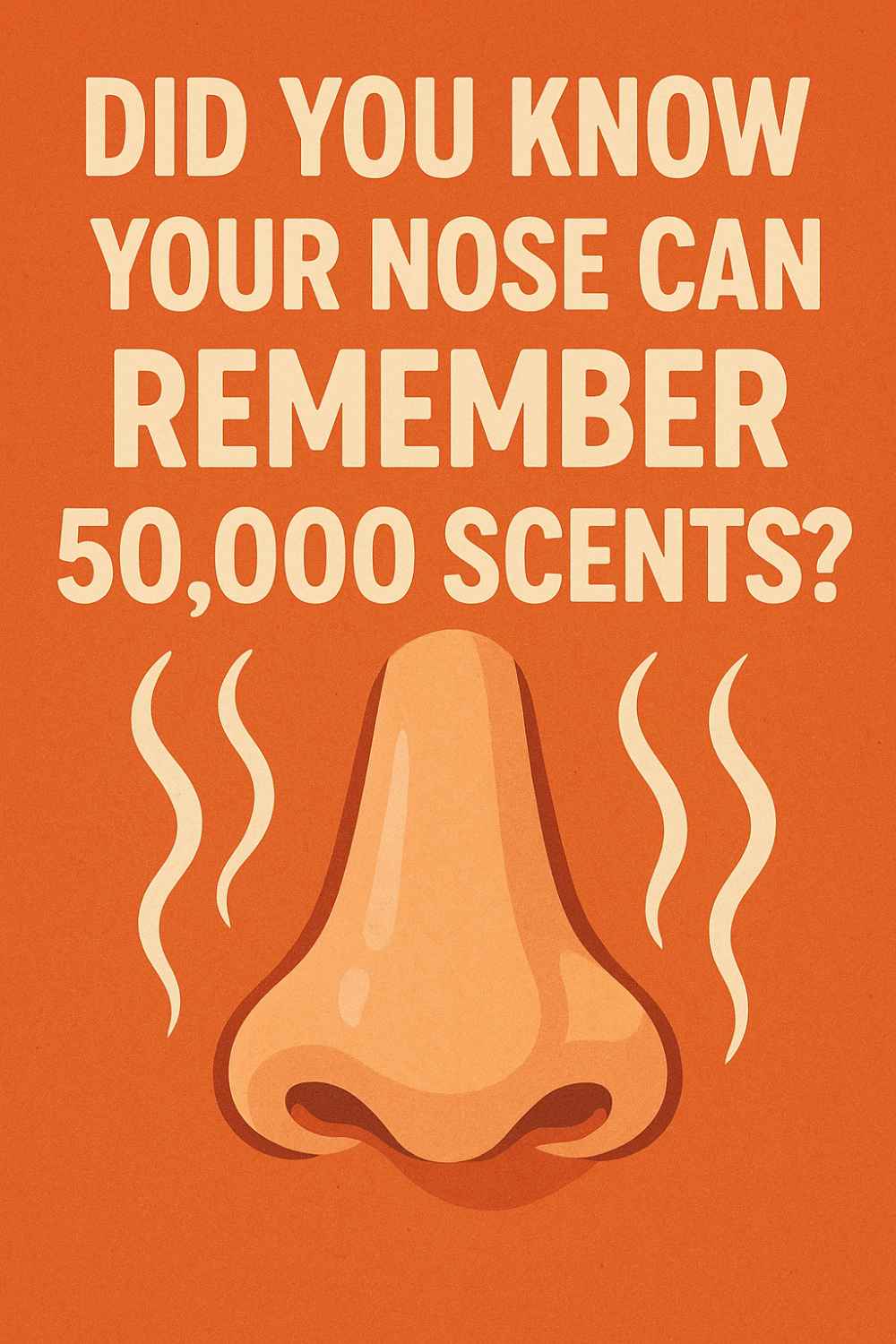 Ever stopped to think about how a whiff of fresh rain or the scent of your grandma’s old perfume can yank you back into a memory so vivid it feels like time travel? That’s your nose flexing its ridiculous power. Scientists say the average human can distinguish between 50,000 different scents—some even argue it’s closer to a trillion. Either way, your schnoz is basically a supercomputer hiding in plain sight, and most of us treat it like a glorified air filter.
Ever stopped to think about how a whiff of fresh rain or the scent of your grandma’s old perfume can yank you back into a memory so vivid it feels like time travel? That’s your nose flexing its ridiculous power. Scientists say the average human can distinguish between 50,000 different scents—some even argue it’s closer to a trillion. Either way, your schnoz is basically a supercomputer hiding in plain sight, and most of us treat it like a glorified air filter.
The Science Behind Your Sniffer’s Genius
Let’s get nerdy for a second. Your olfactory system—fancy talk for “smell hardware”—is wired directly into the brain’s memory and emotion centers. Unlike vision or hearing, which take pit stops in the thalamus before reaching processing zones, smells bypass the middleman. One sniff of burnt toast, and bam—your amygdala (the brain’s drama queen) is already screaming FIRE! before you’ve fully registered the smell.
This direct line to your emotional core is why a whiff of sunscreen can teleport you to a childhood beach day, or why the wrong cologne might make you recoil from a stranger who smells like your ex’s bad decisions.
Why Your Nose Outsmarts Your Eyes (Sometimes)
Think about it: You can glance at a photo and forget it in seconds. But catch a trace of something—freshly cut grass, gasoline, your weird neighbor’s curry obsession—and suddenly, you’re reliving a moment you hadn’t thought about in years. Scents stick because they’re tied to context, not just data.
Your brain doesn’t just log “vanilla = sweet.” It files away “vanilla + Christmas + that time Uncle Dave set the cookies on fire.” The more layers a smell has, the harder it clings. That’s why synthetic “new car smell” never quite hits the same as the real deal—your brain knows it’s being scammed.
The 50,000-Scent Myth (And Why It Doesn’t Matter)
The “50,000 scents” stat gets thrown around a lot, but here’s the kicker: Nobody actually knows the upper limit. Some studies suggest humans can detect over a trillion odor mixtures. The real magic isn’t the number—it’s the precision. You can pick your best friend’s shampoo out of a lineup or detect a single spoiled berry in a fridge full of groceries. Try doing that with colors.
Ever walked into a room and immediately known someone was baking cinnamon rolls somewhere in the house? That’s your nose pulling off a Sherlock-level deduction with zero effort. Meanwhile, your eyes need glasses just to read a menu.
How to Train Your Nose (Yes, Really)
Wine sommeliers, perfumers, and chefs aren’t born with better sniffers—they hack them. You can too. Here’s how:
🌿 Smell everything. Seriously. Coffee beans, herbs, that questionable leftovers container—pause and dissect the layers. Your brain builds a scent library through exposure.
🔥 Blind tests. Have someone hand you random spices or fruits with your eyes closed. Guessing wrong is fine; the workout matters more.
🧠 Pair scents with memories. Next time a smell triggers déjà vu, lean into it. The stronger the emotional link, the sharper your recall gets.
The Dark Side of Scent Memory
Not all smell memories are warm and fuzzy. For trauma survivors, a specific odor can trigger panic attacks before they’ve fully processed why. PTSD researchers call it “olfactory flashbacks”—your nose time-travels, but the destination is hell.
Even mundane smells can turn sinister. Hospitals, dentist offices, certain cleaning products—if your brain files them under “bad experiences,” good luck staying calm when they hit. The upside? This quirk makes scent therapy powerful for rewiring negative associations.
Why Modern Life Is Dulling Your Nose
Open your fridge. Unless you’re a chef or a fermentation fanatic, half of what’s in there probably smells like… nothing. Processed foods, air fresheners, and sanitized everything have turned our world into a sensory desert. We’re losing our edge.
Compare that to hunter-gatherer societies, where tracking scents meant survival. Today? We spray Febreze on actual nature to make it smell “better.” The irony is thicker than airport perfume.
The Weirdest Things Your Nose Knows (That You Don’t)
– You can smell fear. Sweat from scared people has different compounds—and others subconsciously pick up on it. So that “bad vibe” you got from someone? Might’ve been your nose snitching.
– Pheromones are a mess. Despite what cologne ads claim, human pheromones are barely understood. But yes, your nose does influence attraction—just not in the ways pop science screams about.
– Lost scents haunt you. Ever catch a fleeting whiff of something that vanishes before you place it? Some scientists think these “phantom smells” are misfires—like your brain playing scent Mad Libs.
How to Get Your Sniffer Back in Shape
Stop treating your nose like a background actor. Start paying attention:
1. Ditch the nasal autopilot. Next meal? Smell each ingredient first. You’ll taste more, eat slower, and annoy everyone at the table. Worth it.
2. Embrace stink. Not actual rot, but bold smells—fish sauce, aged cheese, durian if you’re brave. The more you expose yourself, the more nuanced your palate becomes.
3. Go nose-blind on purpose. Overload your senses with strong smells (coffee grounds, citrus peels) to “reset” your nose when fragrances overwhelm.
Final Whiff
Your nose is a time machine, a lie detector, and a survival tool rolled into one. It’s also wildly underrated. So next time someone says “stop smelling everything,” remind them: You’re not weird—you’re just using your hardware properly. And if science ever cracks the trillion-scent code? You’ll be ready. 👃

